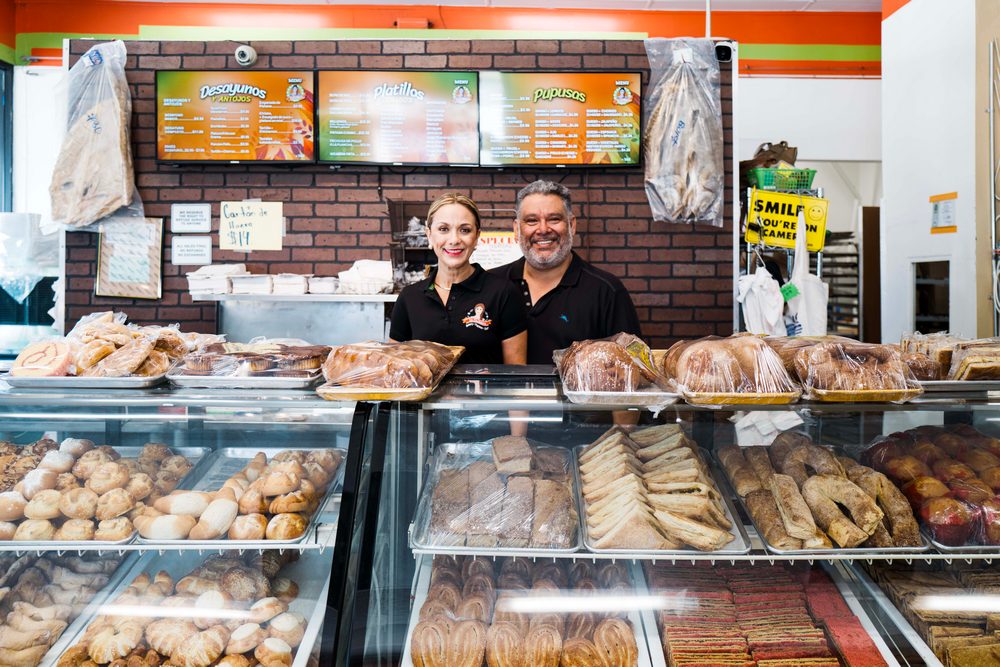La Usuluteca is like a reference library for anyone seeking a better understanding of Salvadoran pan dulce. The scarlet-crowned corner bakery, located two blocks east of Crenshaw on Washington Boulevard, holds a warren of wooden shelves teeming with semitas, quesadillas, and breads. The cold pastry cases here are packed with treats, from the caramelized eclairs known as relampagos to meringue-oozing cuernitos, and wickedly sweet milhojas, a riff on French mille-feuille running over with marshmallow meringue.
The shop was founded 11 years ago this past Tuesday, November 12, by Toni Suarez and Juan Torres, who have established their brand as a primary player in the world of L.A. Salvadoran food. The couple arrived in the U.S. from the southwestern city of Usulutan, El Salvador, in 2008, five years before they cracked the doors to their popular pupusería and panadería.
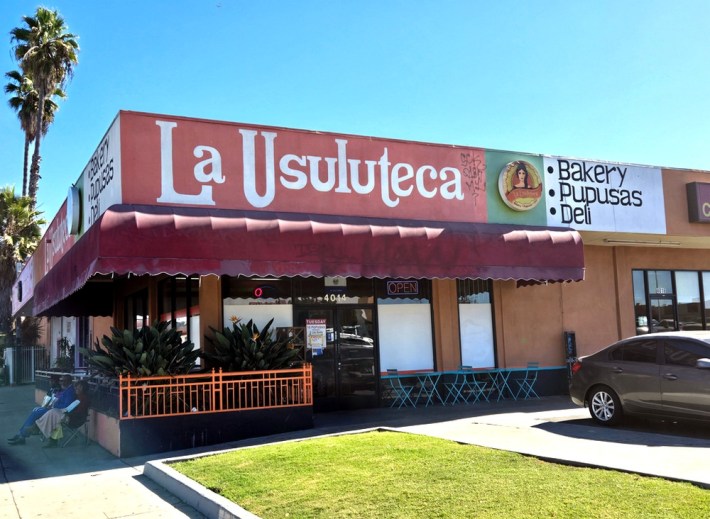
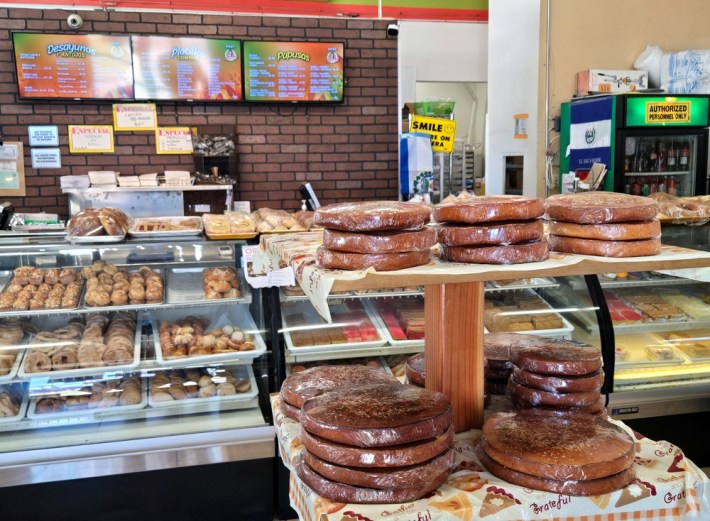
“When we arrived, we didn't know what to do,” Toni tells L.A. TACO. “We saw a niche of sweet bread that were not [made] as we thought they should be. My husband's family has recipes. They used to be bakers of typical Salvadorian bread, and that's how he got inspired.”
For a while, the business focused on pupusas and sweets, with all of the cooking and management done by family members. As its clientele mushroomed, customers began requesting various dishes they missed from home, leading La Usuluteca to add more dishes and traditional soups. In time, the business had to hire bakers beyond its bloodlines and eventually move its pastry production to a Downtown bakery to keep up with demand.
Today, La Usuluteca not only packs early risers in for its to-go breakfast sandwiches and its most popular item, the cheese-infused, rice flour sponge cakes known as quesadillas, from 6 a.m. to 8 p.m. daily. It also thrives with a wholesale business, providing its sweets to the Salvadoran community through Vallarta and Northgate markets. In addition, it supplies numerous loncheras with pastries from Mexico and Central America.
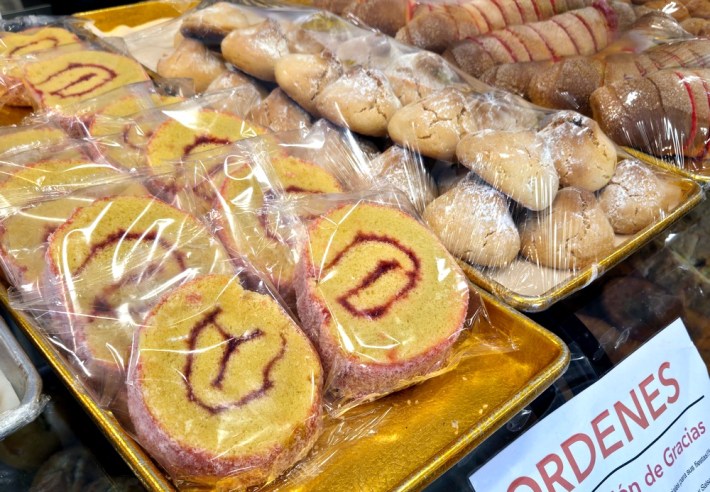
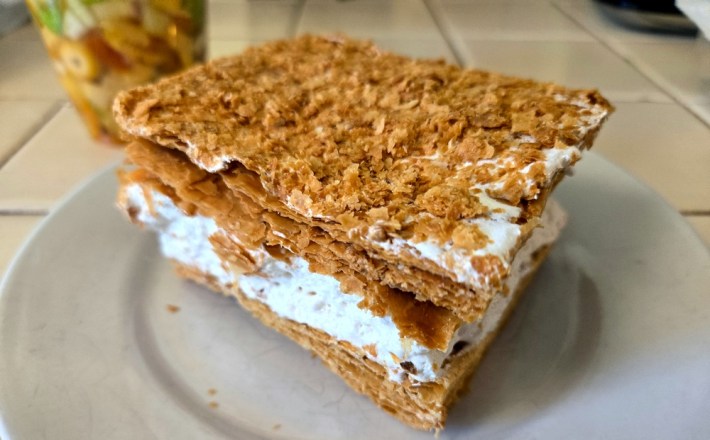
Like El Salvador itself, La Usuluteca is by no means big. Still, it manages to stock a small country’s worth of culinary traditions between its walls. There are bags of chips, chow mein, hot sauces, horchata mixes, and leaf-wrapped cones of whole cane sugar on its left side, imported cheeses on the right in a cold deli case topped with a rack of vintage spelling workbooks for kids.
In between, you’ll find breads, pastries, and a short steam table simmering with hot dishes, like beef-stuffed green pepper rellenos in warm tomato sauce, casamiento (red beans and rice), pollo guisado (chicken stew), asada filets, mojarra frita, and chorizo-bulked borracho beans, named for their legendary ability to hamper hangovers.
“We basically never close, Toni says. “From breakfast till dinner all day, we have warm food ready, so you can just walk in, pick a plate, and just leave.”
Suarez credits the bakery’s success to the couples’ high standards. Whereas many Central American bakeries may lean on more obtainable, cheaper cream cheese for their quesadillas, her family imports the hard cheese traditionally used in El Salvador. The results speak for themselves. The cake is impossibly soft, fluffy, and all too tempting to crunch the whole thing you’d once intended to spread out over a few days.
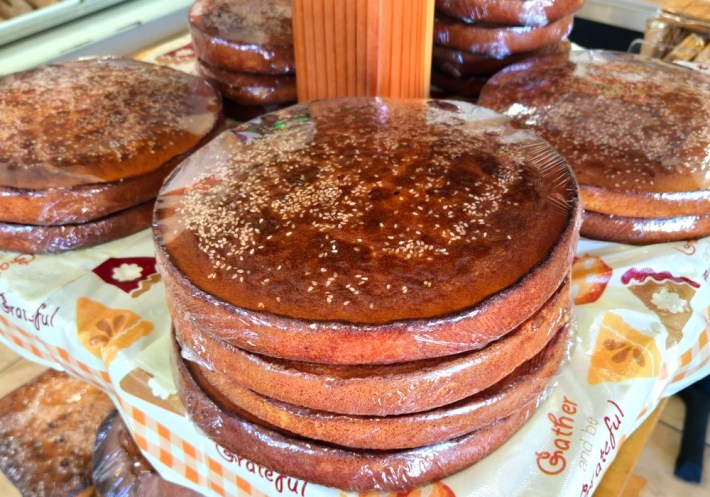
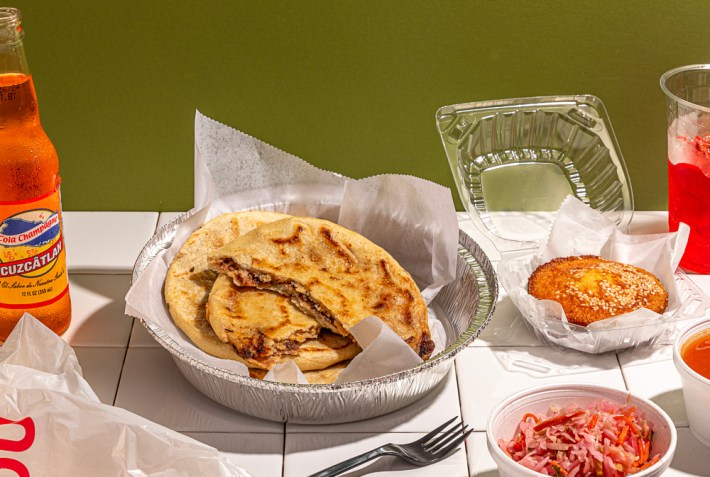
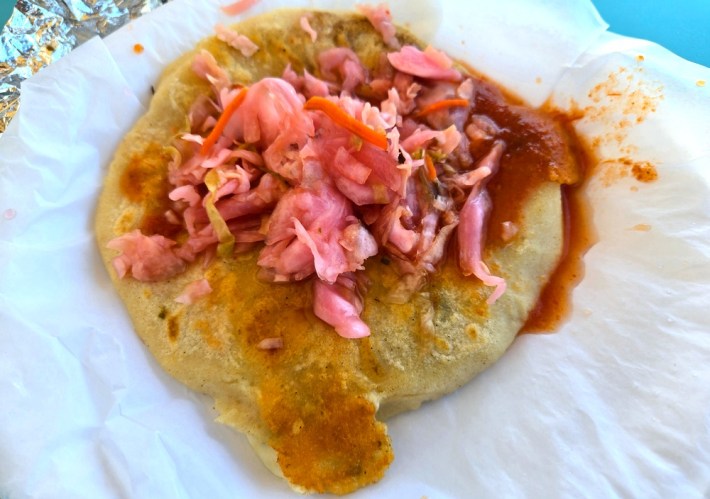
The pupusas similarly stand out. Each is handmade to order, thinner than many, and studded with tiny hot springs of crispy, coagulating cheese-skirt bits that puts them above many competitors. The pupusas are made with stringy mozzarella (for stretch), blended with other cheeses, including a salty Salvadoran specimen, which imbues them with a kick of a baroquely rich umami, not too distant from the subtlest bleu cheese in the mindseye of my tongue.
The shop shreds its own cheese, makes its own chicharrón, and forms its own masa, using a premade Maseca flour, in adherence to its DIY-is-better philosophy. The curtido, which bears slivers of chile habanero, is more intensely spicy and herbaceous than you’ll find at many competing stands and restaurants, an adept contrast to the warm, neutral tomato sauce supplied as salsa.
“You basically think of your loved ones back in El Salvador,” Saurez says. “You know, people who have migrated, what they used to go and eat. We go back and forth to El Salvador constantly, and we're always searching for new things or the things that could be done better.”
La Usuluteca offers all the expected types of pupusas, revueltas and those laced with loroco. In addition, you’ll find pupusas with chicken, jalapeno, garlic, zucchini, and a less commonly seen shrimp pupusa that hearkens back to Usulutan, El Salvador’s primary shrimp producer. Similarly, the bakery offers chachama, the light quesadilla variety Toni says is typical to Usulutan.
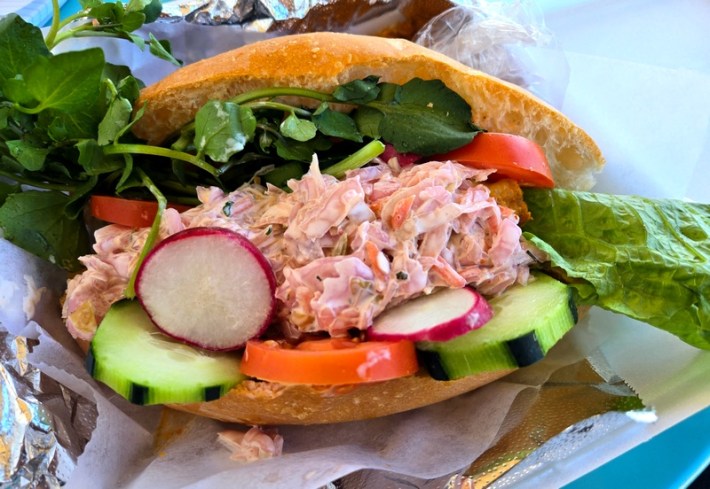

Hulking panes con pollo will overcrowd your small, immobile outdoor table, screwed down into the sidewalk, as well as your hands. Just as its stewed chicken, watercress, fresh cucumbers, tomatoes, and a creamy pink slaw overload its soft pan frances. A tiny bolsita of achiote-tinged red chicken broth is served on the side to drown your sandwich like some kind of Salvadoran French dip, an ideal lunch date when paired with a colorful fresco de ensalada, teeming with mamey, nances, mango, cashew juice, pineapple, apples, and other fruits you can munch on once the drink disappears.
“We made one of our main objectives to import the best nostalgia possible,” says Toni. “That's what we sell. Nostalgia, right?”
Pan dulce remains front and center at La Usuluteca. Toni says the bakery produces over 100 pan dulce recipes, which include Mexican favorites like orejas, tres leches, and cuernitos.
There’s a deep cache of semitas, the traditional, flat, piloncillo-topped cookie-cake-sandwich, layered with pineapple or guava jam and El Salvador-imported dulce de atado, which is a must with your morning coffee.
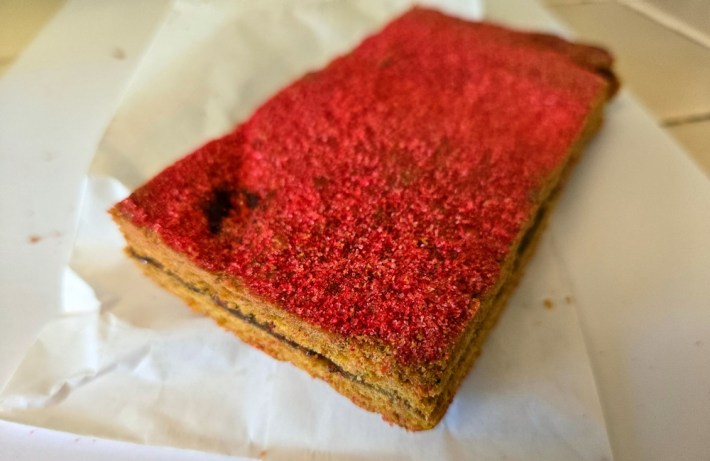
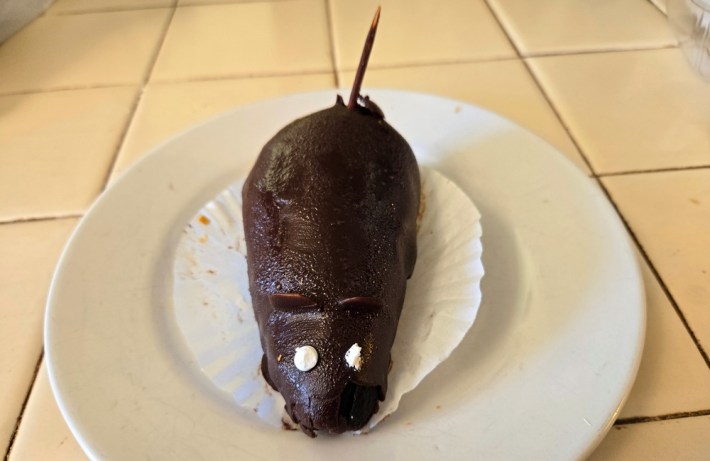
Many Salvadoran sweets are named after women, such as the layered cake known as “Maria Luisa” or the pan dulce known commonly as “novia” (girlfriend). The red sugar-dusted semita, made from imported candy the Usuluteca team hand-crushes, is called peperecha, less, fortunately, translating to “slut,” which says more about the once male-dominated status of panaderías than one’s own taste in the dessert. Even if there’s truth to the maxim of the late, great owner of Winkie Dinkie Dog, when he asserted that “hoes gotta eat, too.”
An Usuluteca favorite of mine is the chocolate cake-based rats that the family started selling to provide something fun for kids, its beady eyes made with meringue, its tail a chocolate-coated toothpick, its body made of chocolate chips, dark cake, and chopped walnuts.
Growing and evolving, 11 years after opening in L.A., is a pipedream for those who invest in million-dollar L.A. restaurants with their eyes on awards and acclaim. Toni cites her enterprise’s biggest challenge as a fight to hold onto its high quality while scaling up.
“I would say maintaining, competing, and trying to maintain the quality of our goods, considering the post pandemic price wars and labor [shortages], because our bread is actually handmade; nothing made with machines or pre-mixes,” she says. “It's all from scratch. So trying to maintain that quality, you know, with the original ingredients, not substituting.”
Currently, La Usuluteca’s owners seem to be succeeding, with plans to expand the retail side of the business to more stores, and thoughts of opening another bakery and restaurant like their time-tested Arlington Heights location. Perhaps in the Valley to reach other large concentrations of Central Americans.
Until then, you’ll find a world of Salvadoran pan dulce to study up on at their eleven-year-old location, still going strong after all these years in a crowded parking lot in Arlington Heights.
La Usuluteca ~ 4014 W. Washington Blvd. Los Angeles, CA 90019
